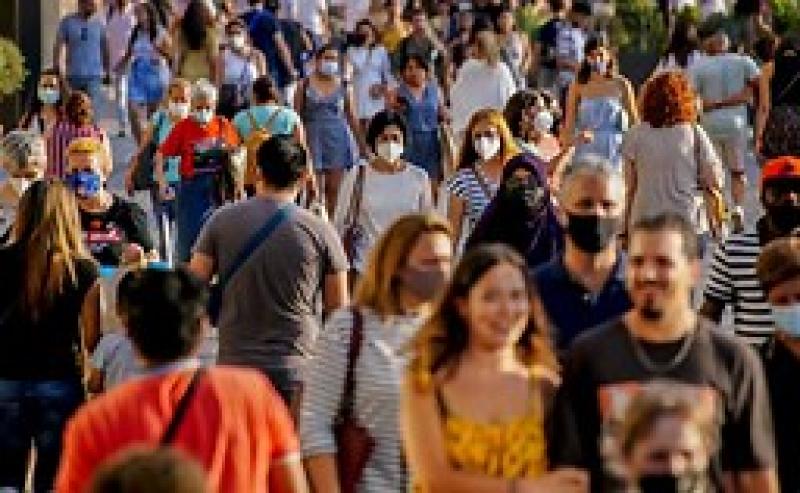The difference in Spain is stark. People wear masks, no one complains. | Opinion



When I disembarked in Madrid on Sept. 2, I was ready to roll up my sleeves. Congregations there and in Barcelona had invited me to spend the Jewish High Holy Day season with them.
I knew these communities, but of course, I hadn’t been there since before the onset of the pandemic. Happily, it proved a fun, gratifying and even a moving experience. There were some iffy linguistic moments but my Spanish prevailed. My rabbinic work kept me busy. But from the moment I stepped off the plane, the country’s response to COVID-19 was constantly on my mind. The difference from what I had left behind was stark.
I had looked upthe statistics before leaving home. The day I left, over 77% of Spaniards had received at least their first vaccination, a full 20% more than in the United States on that same date. Spain’s per capita cases of COVID-19 and deaths from COVID-19 were lower. Spain had an especially rough start to the pandemic, so this was surprising.
And the numbers, I found, reflected an attitude. Masks were everywhere. Despite the lifting of the outdoor mask mandate in July, at least half the people in Madrid and Barcelona masked up just to walk down the street. Indoors, except at a restaurant table, masking was universal.
And people didn’t complain. No one enjoys wearing masks, of course, but they weren’t a source of conflict. No slipping it under the nose, no arguing with a museum guard or a flight attendant, no articles in the newspaper about groups or individuals challenging government public health edicts. Everybody followed the rules.
Shortly after my arrival, a friend emailed,“ do you feel safe there?” I answered honestly. “Safer than I do at home.”
Avi Astor, a sociology professor at the Universidad Autonoma de Barcelona, pointed out to me that, unlike in the U.S., in Spain, COVID-19 is not a religious issue. “The Christian Evangelicals who are so outspoken in the U.S. are few in number here and appear not to have made this their issue.” The Catholic Church openly supports government efforts.
Individual anti-vaxxer cranks show up on Spanish social media. But they are not organized and little attention is paid to them.
Astor also noted that in Spain’s more traditional society, multi-generational homes are far more common, many middle-aged people take care of their elderly parents, and that “they are likely more sensitive to the risk. They don’t want to be the cause of the death of a loved one.”
Religious and family life are characteristics of a society, in this case, characteristics that serve Spain well. But there are other differences as well.
One is Spain’s approach to public health. The government provides medical care that is both affordable and high quality. Everyone has a personal relationship with a clinic that, in cities, is within a short walk from home. Every single person I spoke to said they like and trust the system. COVID-19 is a public health crisis, so it is natural for them to follow the lead of the Sistema Nacional de Salud — the National Health System.
In the U.S., on the other hand, the inequities and insecurities of our own system, the competing interests of pharmaceutical companies, corporate owners of medical facilities, healthcare personnel and, especially, insurance companies, often sow distrust and cynicism. Institutionally, we were ill-equipped to confront a pandemic.
But the most significant difference is also the most obvious one. Politics.
From the moment then-President Trump chose to ignore the science, touting bizarre (and false) cures and spouting lies about COVID-19, the politicization of the pandemic is likely the largest reason over 700,000 of us have died. The impact of his actions, and the impact of his influence on his base, will likely not be fully realized for years.
In Spain, on the other hand, as Astor notes, “the pandemic did not become politicized. It could have. There were major lockdowns here. Initially, the country did not address it well. Kids could not go outside. It was awful.”
If an opposition party had bellowed, “the imperial government wants to oppress you, if you believe in freedom, if you believe in individual rights….” It is frightening to think what might have happened.
But somehow, after some initial bickering, the crisis mitigated the entrenched hostilities among the parties that make up Spain’s political spectrum. Party heads decided — or maybe they didn’t even have to think about it — this was not the moment. And the impact on the Spanish people of seeing their political leadership united, without gamesmanship, standing together, is incalculable.
Much of the Spanish model is irrelevant to us; how we organize our religion and how we organize our families are just who we are.
But had we developed a health care system devoted solely to the physical and mental wellbeing of individual Americans, if intelligence, responsibility, and gravitas hallmarks of our political leadership, perhaps the carnage would not have been so severe.





A little health-related bipartisan unity would be nice, but I'm afraid that's a dream that once was.
The only reason Fauci and the CDC were undermined in 2020 was Trumpism. Tens of thousands of people were sacrificed on the altar of Trumpism and its deranged leader.
If I could have voted that seed up 10 times I would have. It outlines the very reasons why China's numbers are so ASTRONOMICALLY different from America's, because the Chinese people AS A WHOLE used the same common sense, used the same reasons, IN SPADES that the Spanish people did (and too many of the Americans didn't).